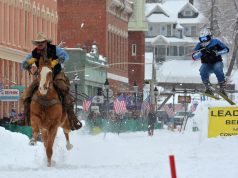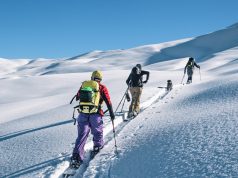
Carl Jung believed reaching full potential as a human required exploration of our deepest thoughts, those feelings that lay buried deep beneath our consciousness. As he put it, “There is no energy unless there is a tension of opposites; hence it is necessary to discover the opposite attitude of the conscious mind.”
Sometimes, Jung said, one’s “opposite attitude” can counter conscious thoughts so completely as to seem destructive, so we avoid and fear whole parts of ourselves.
If we search ourselves truthfully, there’s duality within us all — a desire to live a long life, yet the strange, fatal impulse we can feel near the edge of a cliff. Or, less morbid, a lifetime of guitar lessons and dreams of life as a musician thwarted by shyness and fear of rejection and failure.
We stand in our own way. We ignore parts of our personalities because we think it’ll keep us safe from physical and emotional harm.
But sometimes all it does is keep us from being who we want to be. Some people learn to cliff dive, and others fight stage fright to become stars.
There’s always been this awareness of duality in competitive mountain bike racer Tim Dardis.
“There’s part of me that likes to be outside, and part of me that likes to be by myself on the couch reading books and watching Netflix,” Dardis says.
The long-time Boulder resident has always found himself caught between these seemingly opposite qualities, but instead of shunning one for the other, he found inspiration in the space between.
Dardis recently debuted his first book, a selected collection of poetry called Road Rash, at Innisfree Bookstore. While the title and the front cover — a photo of a mountain biker sailing through the air in what appears to be the moments just before a crash — might indicate this is exclusively a collection of adventure poems, Road Rash is a broader examination of life and the world in general. The collection highlights Dardis’ stylized practice of poetics through a blend of personal exploration, cultural curiosity and eco-poetics.
It’s the day of his debut at Innisfree, and Dardis has taken off work a few hours early to meet in a coffee shop and talk about his book before his reading that evening. He admits he wondered what he’d have to say about himself, about his work.
“If you’d asked me a year ago, ‘Can you imagine sitting and having someone interview you about your poetry? That you’re going to be reading out of your own book to people?’ No,” he says, with a gentle shake of his head. “I’m a guy that works in a cube. What the hell? I think the biggest adventure I’ve done in a while is getting up tonight [at the reading], and trusting that everything is going to be OK.”
Actually, Dardis says, if he’s being honest, his first response when asked to read from his book was “no.” But something made him feel as though it was OK to say yes — that it was OK to share this private side of his personality.
So Dardis said yes, despite his fear and trepidation. He trusted a different part of himself.
There was tension. There was energy.
That unconscious trust has led Dardis through his life, to the in-between space where his creativity and athleticism both seem to flourish.
• • • •
Bikes were always a part of Dardis’ life — he remembers his first fixie bike as a child in Northbrook, Illinois — but it was his parents that inadvertently gave their son his passion for bikes.
It was the late ’70s, and Dardis’ parents asked their pre-teen son to ride in the RAGBRAI, The Des Moines Register’s annual bike ride across Iowa.
The young Dardis did not want to go.
“But they made me,” he says. “And I just remember being by myself on a country road in Iowa on a fivespeed Schwinn bike and thinking, ‘This is the coolest thing I’ve ever done’ — and I’ve never lost that.”
Years later, Dardis found himself living in the suburbs of Chicago pursuing a master’s degree in special education, working with students who had behavioral disorders in a class room “known as the cage.”
Something wasn’t right in his life, and instead of ignoring his discomfort and continuing on what some might have called the safest path, Dardis listened to his inner voice.
“I looked up at the skyline one night from the University of Illinois Circle Campus and this thought just said, ‘You need to go to Boulder and study poetry.’”
Dardis’ brother was living in Boulder, and Dardis has traveled through the city on numerous occasions with his family on vacations to California. He knew Boulder was a Mecca for cyclists, and he knew Chicago wasn’t conducive to the lifestyle he wanted to lead.
So he packed up and moved west, leaving behind his master’s in special education to pursue a master’s in creative writing at the University of Colorado. He admits that while graduate school got him to Boulder, the real intention was to be a part of a community that valued an outdoor life, namely biking and skiing.
But even at this point, Dardis wasn’t consistently competitive with his cycling. He had competed in his first bike race, a cyclocross, when he was 20, then raced on velodromes in Illinois and Wisconsin and did a few criterions around northern Chicago. But Dardis says he was never quite able — or willing — to commit to the training it took to truly be competitive. So he decided to just ride his bike and ski — a lot.
And grad school kept him busy, though he wasn’t enjoying it the way he thought he would.
“I had a hard time writing to order in grad school,” he says. “Those things (poems) were delivered to me, and I followed. I couldn’t do it when I was asked. I internalized this as, ‘I suck as this.’”
But that fear never stopped him from writing, nor from riding. He jokes that his friends would ask, “How’s your writing?” and he always had to ask if they were inquiring about his poetry (writing) or his bike (riding).
Dardis had also developed a love for mountain biking. He had a group of friends that rode regularly, and he found he preferred riding on dirt to asphalt or concrete. But still, cycling was something he did for himself, never competitively.
He made it through grad school but felt, like many graduate students, like that was enough. He did not pursue a Ph.D., nor a teaching career. He found a job as a content services specialist for a startup business in Boulder that allowed him to work to live, as opposed to living to work. Dardis and many of his coworkers were able to take bike rides or long runs during their lunch breaks. The Valmont Bike Park was right next door to their offices.
More than a decade passed before Dardis “committed” himself to training for mountain bike racing. He was 43.
“There was suddenly this moment,” he says. “I had tried racing, dabbled in it, but never really felt I wanted to commit to it. Then the voice in my head said, ‘It’s time to go do that now.’ I had folks in my life who were involved in it and I just sort of reached out and said, ‘Yes.’”
His first race was in Winter Park — a hill climb.
“I thought, ‘I just don’t want to be last,’ and I wasn’t,” Dardis says. “I found myself committed to it. I got a coach and she started giving me workouts, so I didn’t have to think about that kind of stuff, and I developed a taste for hard work and discipline. Then you start to race and you go faster than people and it becomes addictive. Then when you start getting results, it’s very good for the ego. That lifestyle just became my lifestyle.”
And all the while, Dardis continued to write poetry. His work appeared in House Organ, Exquisite Corpse, Toad Suck Review, Flatirons Literary Review, Chicago Literati, Fat City Review, Tic Toc, Midnight Screaming, Hudson Valley Echoes, Grasslands Review, Sierra Nevada College Review and more.
Still, this was a side of Dardis that few people knew. He often submitted his work anonymously.
“There’s a quote by a poet named Jill McDonough that says — and I’m paraphrasing this — ‘Poems are a great place to tell your secrets because nobody reads them but you and me,’” Dardis says. He delivers the joke with a tiny smile, but he’s serious.
In addition to submitting his poems to literary reviews, Dardis also shared his work with close friends, like fellow writer Mark Spitzer.
Eventually, Dardis realized how much work he’d built up over the years, and he reached out to Spitzer to ask what to do next. The answer was simple: publish a book.
Spitzer and an assistant helped select poems from Dardis’ collection, sequence them, edit and design a book cover.
Dardis says the process was difficult; he often had to let go of his beliefs about his work and put his faith in someone else.
“To bring it outside to people is a real artifact of my experience,” Dardis says. “Nobody knew this about me… a few people did, but a lot of people I’ve gotten to know in my life recently didn’t know that I write. I’ve been able to present this part of myself and then step up into it.”
His poems range in subject matter: some look at shared experiences like the 9/11 attacks. One poem, called “The First Israeli Astronaut,” is written from the perspective of Colonel Ilan Ramon: The Middle East/appears to be at peace/he said from space./There is no war in zero g.
Many poems are more personal, like “Viscosupplementation:”
Crossing Boulder by car is a crap shoot,/a throw of the dice, a bet on/congestion from construction,/red lights, crosswalks, and people/ who drive beneath the speed limit./But I arrive on time/at the sports medicine center/for the first set of five/intra-articular injections:/the biannual anatomical oil change/for my osteoarthritic, microfractured knees.
“Just thinking about how I grow with my racing, it’s the same with my writing…” Dardis says, trailing off a bit as he thinks in real time. “By saying yes to this (competitive racing) and showing up and then continuing… I’m just a run-of-themill guy who rides his bike — I’m never gonna be a pro racer. Nobody knows who I am, but to get out there and compete and go faster than somebody, to get on a podium, to say yes to a race in Keystone or Breckenridge and feeling strong and confident, that opened up a new part of myself to experiencing the world and saying yes to my life in a different way.”
At 51, healing from blown out knees and other injuries, Dardis says he wonders if he’ll keep racing. One of his goals this season is to figure that out. But there’s one thing he knows will always be true, no matter how old he is.
“When I am on my bike, I feel like I’m 9.”
Road Rash is available for purchase at the Beat Book Shop in Boulder and Local Editions Books and Coffee in Longmont. It can also be purchased through online booksellers or directly through the publisher at [email protected]














